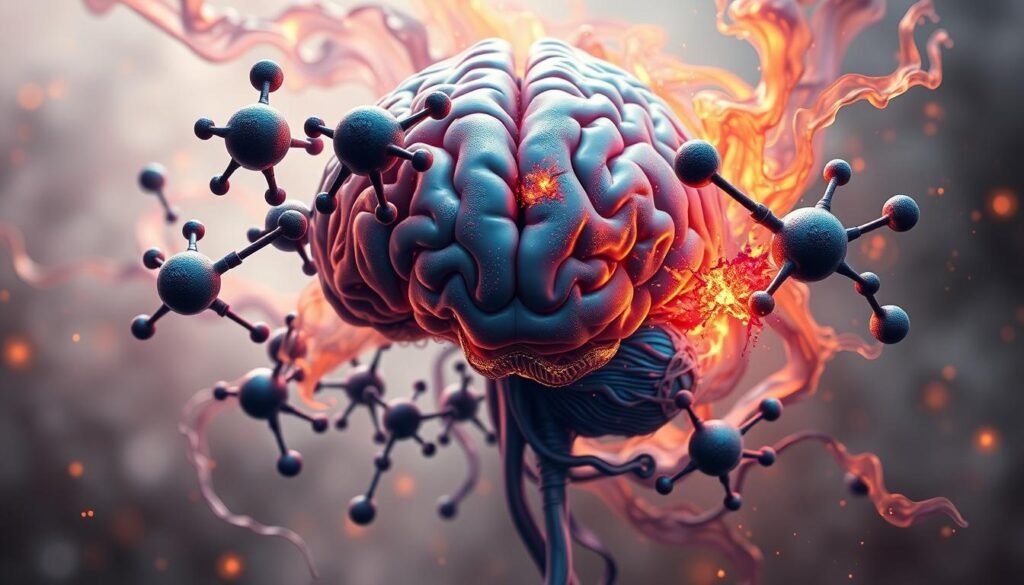Ever wondered how a tiny neurotransmitter could affect your feelings and mental health so much? Norepinephrine, often not talked about much, is key for managing emotions, energy, and stress. It’s linked to problems in mental health, including anxiety and ADHD. This piece will highlight how norepinephrine operates and its impact on our mood and mental wellness.
Key Takeaways
- Norepinephrine levels are low in major depressive disorders but high in ADHD.
- Antidepressants like SSRIs and SNRIs are prescribed to boost norepinephrine and serotonin levels.
- SNRIs may be more effective for depression than SSRIs but often come with additional side effects.
- Chronic stress can decrease norepinephrine levels, worsening anxiety and depression.
- Genetic factors and post-mortem studies reveal crucial insights into the norepinephrine system’s role in depression.
Understanding Norepinephrine
Norepinephrine is key in brain chemistry, acting as both a neurotransmitter and hormone. It helps control the body’s stress response, triggering “fight or flight.” This neurotransmitter also supports attention, memory, and emotional balance. By exploring norepinephrine, we learn about its influence on mental health and well-being.
What is Norepinephrine?
Norepinephrine, or noradrenaline, comes from adrenal glands and the brain stem. In the central nervous system, it boosts mood and alertness. Too little may cause anxiety, depression, and attention issues. Too much can raise blood pressure and heart rate. So, it’s vital to keep norepinephrine levels in check for good mental health.
Role of Norepinephrine in the Brain
Norepinephrine is crucial for staying emotionally balanced and energetic. It affects how well we pay attention and remember things. It also helps manage sleep and metabolism. Not enough norepinephrine can make you feel tired, sad, or forgetful. Raising its levels through exercise, rest, and certain foods can boost your mood and brain power. Studies are ongoing to find new ways to use norepinephrine for better mental health.
The Neurotransmitter Connection
Neurotransmitters play a key role in our mental health, especially with depression. Studies show that neurotransmitters like norepinephrine, serotonin, and dopamine are crucial for our mental well-being. An imbalance in these can greatly affect our mood and emotional health.
Norepinephrine and Other Neurotransmitters
Norepinephrine affects our mood and energy. Those with low levels of this neurotransmitter might feel more depressed. Serotonin and dopamine also impact our mental health, creating a complex interplay. According to research, changes in norepinephrine levels can show distinct biochemical changes in those with depression versus healthy people.
The Monoamine Hypothesis in Depression
The monoamine hypothesis looks at how low neurotransmitter levels may cause depression. It suggests that not enough norepinephrine, serotonin, and dopamine can lead to depression. Knowing this is especially important for those with a family history of depression. Research continues into how these neurotransmitters work and how to fix their imbalances.
| Neurotransmitter | Role in Depression | Link to Norepinephrine |
|---|---|---|
| Norepinephrine | Regulates mood, energy levels, and stress response | Deficiency is linked to low energy and mood disturbances |
| Serotonin | Regulates sleep, appetite, and aggression | Imbalances often co-occur with norepinephrine issues |
| Dopamine | Affects mood and pleasure responses | Interacts with norepinephrine levels affecting motivation |
Norepinephrine Depression: Its Impact on Mental Health
It’s key to understand how norepinephrine and depression interact. Low levels of this neurotransmitter can lead to depression. People with not enough norepinephrine might feel very tired, lack motivation, and have trouble focusing.
Depression affects lots of people globally. Its impact on mental health is huge and widespread.
How Low Norepinephrine Levels Contribute to Depression
Studies link low norepinephrine to major depressive disorder (MDD). People with MDD often have lower activity of this neurotransmitter. It’s especially true in certain brain areas, like the locus coeruleus.
This brain area helps us stay alert and handle stress. Imbalances in norepinephrine can harm our thinking and how we regulate emotions. These issues highlight the role of norepinephrine in keeping our minds healthy.
Related Symptoms of Norepinephrine Deficiency
Knowing the signs of norepinephrine deficiency helps in treating it. People might face fatigue, trouble thinking, or feel hopeless. They might also have sleep problems or become very emotional.
- Fatigue and low energy levels
- Difficulty concentrating or making decisions
- Increased feelings of hopelessness or worthlessness
- Changes in sleep patterns
- Emotional instability and irritability
Spotting these depression symptoms helps in finding the right treatment. Treatments like SNRIs work by balancing norepinephrine levels. They aim to treat both the brain’s chemistry and the emotional symptoms of MDD.
To learn more about depression’s effects on the brain and body, click here.
Norepinephrine in Anxiety Disorders
Norepinephrine is key in how we deal with stress and anxiety. It plays a big role in anxiety disorders. Knowing how it works with anxiety helps us find better treatments and ways to manage mental health.
Relationship Between Norepinephrine and Anxiety
Studies show that norepinephrine and anxiety disorders are closely connected. This neurotransmitter makes us more alert and ready to react, which is useful when facing danger.
During stressful times, it boosts our fight-or-flight response by increasing our heart rate and blood flow. However, if norepinephrine levels stay high for too long, it can lead to ongoing anxiety.
The Dual Role of Norepinephrine: Anxiogenic vs. Anxiolytic Effects
Norepinephrine has two sides when it comes to anxiety. Sometimes, it can make anxiety and fear worse, especially under too much pressure. Other times, it can help reduce anxiety, like during certain therapies or calming activities.
This makes diagnosing and treating anxiety disorders more complex. Fluctuations in norepinephrine can affect how each person responds to treatment. It’s important to understand this for better handling of anxiety and depression together.

| Effect | Description |
|---|---|
| Anxiogenic | Increases anxiety responses, impacting alertness and stress responses. |
| Anxiolytic | Can mitigate anxiety in appropriate situations, promoting calmness. |
| Dysregulation | Leads to heightened anxiety states, complicating treatment for co-occurring disorders. |
Treating Norepinephrine Depression with Medications
Norepinephrine is key in mood regulation. This has led to the creation of antidepressants that target its levels. Among them, serotonin-norepinephrine reuptake inhibitors (SNRIs) are prominent for their effectiveness. They boost the levels of serotonin and norepinephrine in the brain. This is helpful for people with depression and anxiety.
Introduction to SNRIs
SNRIs like Desvenlafaxine, Duloxetine, and Venlafaxine stop serotonin and norepinephrine from being reabsorbed. This boosts mood and emotional health. Studies show that SNRIs aid those with moderate to severe depression.
It may take one to two weeks for SNRIs to work. Treatment often combines medication with therapy. For more on NDRIs benefits, visit American Addiction Centers.
Side Effects of Serotonin-Norepinephrine Reuptake Inhibitors
SNRIs can relieve depression but may cause side effects. These include sweating, fatigue, dry mouth, and high blood pressure. Patients might also see dizziness and loss of appetite.
Knowing these side effects helps in talking with doctors. Mixing medications and healthy habits, like exercise, can improve well-being. Some drug combinations might increase bleeding risks. For more on sleep and mental health, see Immune Vitality.
| Medication Type | Commonly Prescribed Medications | Side Effects |
|---|---|---|
| SNRIs | Desvenlafaxine, Duloxetine, Venlafaxine | Dry mouth, fatigue, increased blood pressure |
| SSRIs | Citalopram, Escitalopram, Sertraline | Insomnia, dizziness, sexual dysfunction |
| TCAs | Amitriptyline, Imipramine | Constipation, blurred vision, weight gain |
The Effects of Norepinephrine on Mood Regulation
Norepinephrine is key in controlling how we feel and our energy levels. It affects our ability to handle stress and daily experiences, shaping our mental health. Having the right amount of this neurotransmitter keeps us feeling good. Too much or too little can cause mental health problems.
How Norepinephrine Influences Mood and Energy Levels
When our body releases norepinephrine, we feel more alert and energetic. This helps us deal with stress better. Having enough norepinephrine makes it easier to manage our emotions. But, if we don’t have enough, we might feel tired and sad.
Experts say a normal norepinephrine level is between 70 and 1700 picograms per milliliter (pg/mL). Being below this can lead to mood issues, ADHD, and fibromyalgia. Too much norepinephrine can cause anxiety and stress, making us feel more anxious and unstable.
An imbalance in norepinephrine affects our mental health a lot. Knowing how it links to our mood and energy is important, especially for those dealing with mental health challenges. Keeping norepinephrine balanced helps support a stable mood and emotional strength.

Role of Norepinephrine in ADHD
Norepinephrine is key in ADHD, influencing attention levels. It is found that issues with norepinephrine can make focusing hard, a common problem for those with ADHD. Knowing this helps in creating treatments aimed at easing symptoms.
Link Between Norepinephrine and Attention Deficits
There’s a lot of interest in how norepinephrine and ADHD are connected. About 80% of ADHD meds work by raising norepinephrine and dopamine in the brain. These drugs, including stimulants like methylphenidate and amphetamine, have been used since the 1930s thanks to psychiatrist Charles Bradley’s work.
Ritalin and Concerta have been key in treating ADHD since the 1960s. There are also non-stimulant choices like Strattera and Qelbree. They work differently but also help with impulse control and memory. Both drug types have shown they can make a difference.
Even though these drugs help, they can have side effects like insomnia, loss of appetite, and mood changes. Non-stimulant drugs might cause nausea and fatigue. It often takes 3 to 6 months to find the right drug, trying different ones to see what works best.
The role of norepinephrine in cognitive functions, like working memory, is significant for ADHD. PET scan studies show we need more research on how norepinephrine levels affect ADHD. These findings suggest that problems with norepinephrine might be a big reason for attention issues in ADHD.
Stress Response and Norepinephrine Levels
Knowing how stress response and norepinephrine levels connect is key for mental health. Stress can cause a lot of physical changes. Norepinephrine helps regulate mood and keep emotions stable.
Chronic Stress and Its Effects on Norepinephrine
Long-term stress changes norepinephrine levels. If stress keeps up, norepinephrine release goes up. This reacts to anxiety and depression in the brain. With too much stress, norepinephrine levels can drop when you really need them. This makes you more likely to get major depressive disorder (MDD).
Studies show that being stressed for a long time raises the risk of MDD. This is especially true for young people with tough life conditions. Stress affects certain brain cells and receptors linked to depression. This shows how crucial norepinephrine is for dealing with mental health issues from stress.
It’s important to keep norepinephrine levels balanced to lessen chronic stress impacts. Managing stress well can help keep these levels right. Doing so helps protect against depression and anxiety disorders.
Conclusion
Norepinephrine is key for mental health, touching on mood, stress, and treating anxiety and depression. Its complex link to depression underlines the need for precise treatments. Studies highlight how well-managed norepinephrine levels can ease symptoms.
Long-term treatment boosts not just norepinephrine but the whole sympathetic nervous system. This proves how crucial these neurotransmitters are in therapy. It’s been observed that changes in norepinephrine are more about how fast it clears, not system overactivity. This insight helps understand its mental health impacts better.
Future studies are vital for grasping norepinephrine’s role in mental disorders. They aim to craft targeted therapies for better depression management. For more on norepinephrine’s effect on depression and treatment methods, see the full study here.